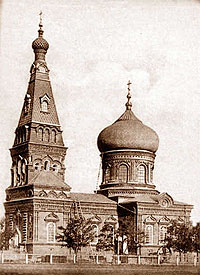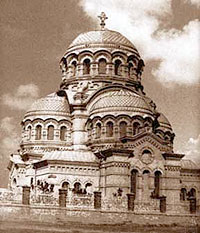|
||||||||||||||||||
|
Yekaterinoslav 
In the beginning of 19th century the city of Yekaterinoslav had only 6389 inhabitants, in 1865 - 22,816, in 1887 - 48,000 and in 1897 the population had increased to 121, 200 people. For the last thirty years of the century the population of the city increased 5 times. What was reason for such a population boom?
Two men: the Englishman Mr. John Hughes (who developed the Donetsk coal deposits) and Ukrainian Alexandr Pol',
who opened the Kryvyi Rih iron ores. He found ore casually in 1866 while involved in archaeological research. The Donetsk
coal was necessary for melting the pig-iron of Kryvyi Rih ore and there was a need for a connecting railway. It wasn't until
1881 that the sanction for its construction was received and in 1884 it began to work. The constant metal bridge through
Dnieper was opened. From this moment the city began to grow quickly. New settlements appeared: Amur, Nizhnedniprovsk
and the factory areas developed. In 1897, because of the development of the city, third in the Russian Empire, Yekaterinoslav
opened the electrical tram... In 1899 the High Mining School was open and by 1913 it had grown to be the Mining Institute.
The end of 1905 was filled with blood of the first anti-tsar revolts. Some tens of people were killed and hundreds were
wounded. The wave of devastation of the Jews had passed. The atmosphere in society was heated. After the revolution of
1917 and the subsequent Civil War the city was dominated by ruin and an infinite change of authorities for some years.
All this resulted in a paralysis of industry and transport.
|
||||||||||||||||||
 During eight months of 1918, in the period of Hetman (the Chairman
of Ukraine), under the decree of Hetman Pavlo Skoropads'kyi, the city was called Sicheslav. By Skoropads'kyi's initiative
the University in Yekaterinoslav was open on the basis of High Female School. Finally, the authority of the Bolshevik Party
was established in Prydniprovye to the end of 1920, but there were still a few revolts up to the middle of 1921.
In 1926 the city of Yekaterinoslav was renamed - Dnipropetrovsk had appeared.... The Dnipropetrovs'k (Dnepropetrovsk
in Russian) city name consists of two words: "Dnipro" (Dnieper River) and "Petrovsk" (named for Petrovskiy). Grigoriy
Petrovskiy (1878-1958) was the first Parliament (Soviet) leader of the new communist Ukrainian republic.
During eight months of 1918, in the period of Hetman (the Chairman
of Ukraine), under the decree of Hetman Pavlo Skoropads'kyi, the city was called Sicheslav. By Skoropads'kyi's initiative
the University in Yekaterinoslav was open on the basis of High Female School. Finally, the authority of the Bolshevik Party
was established in Prydniprovye to the end of 1920, but there were still a few revolts up to the middle of 1921.
In 1926 the city of Yekaterinoslav was renamed - Dnipropetrovsk had appeared.... The Dnipropetrovs'k (Dnepropetrovsk
in Russian) city name consists of two words: "Dnipro" (Dnieper River) and "Petrovsk" (named for Petrovskiy). Grigoriy
Petrovskiy (1878-1958) was the first Parliament (Soviet) leader of the new communist Ukrainian republic.
